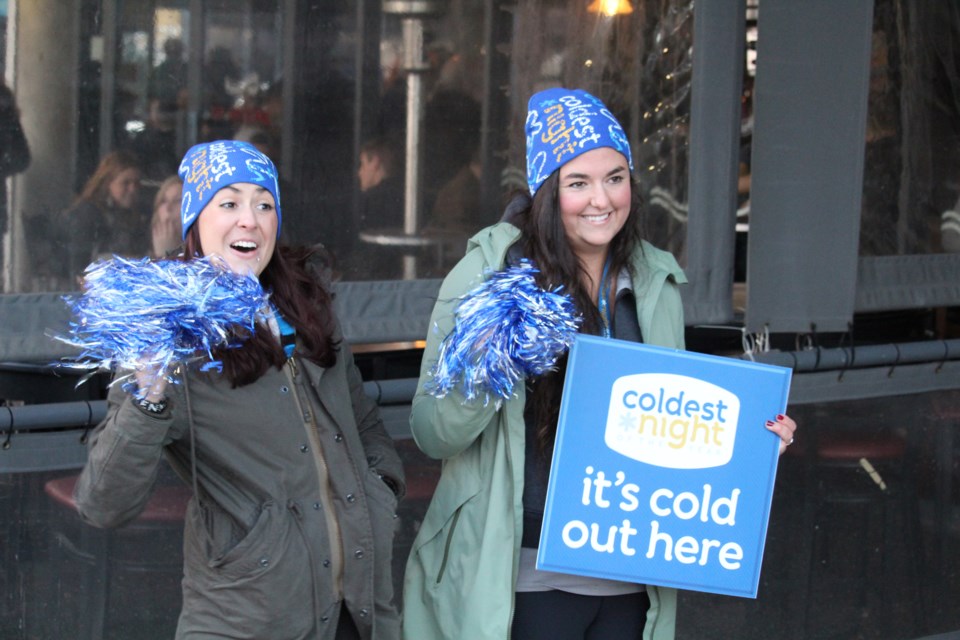The Seniors Services Society is hard at work on initiatives aimed at helping the growing number of seniors who are homeless or at-risk of homelessness.
The society, which is the only society in Metro Vancouver working exclusively with homeless and at-risk seniors, is holding its annual Coldest Night of the Year fundraising walk on Saturday, Feb. 24 at River Market, 810 Quayside Dr.
“We are running a walkathon to create awareness and raise funds to combat the plight of homelessness among the senior population in Metro Vancouver,” said Kara-Leigh Bloch, executive director of the Seniors Services Society. “This walk is run all over Canada on the same day – on what they have deemed the coldest night. It’s usually quite brisk.”
According to the society, in the last year, its seniors housing programs have delivered individualized housing counselling to more than 2,000 seniors, one-on-one housing outreach to 268 seniors who are homeless or severely at-risk of homelessness and temporary housing to 25 homeless seniors while assisting them with finding permanent housing. The society states that its programs have directly resulted in 65 seniors finding permanent housing – but it requires help to do the work needed.
The national Coldest Night of the Year campaign seeks to empower agencies in communities that are working to combat hungry, homeless or hurting folks by raising funds through a walk that takes place on a chilly evening in February. In New Westminster, the Seniors Services Society is raising funds for its homeless outreach program, which provides full-time outreach workers who work specifically with seniors.
“We just recently changed our mandate to working with over 60 years of age. Last year we would have been working without those 55-plus, but this year we have seen such a rise in the older senior, the 70-, 80-plus senior and we have changed it to work with 60-plus,” Bloch explained. “It’s for providing one-on-one outreach. Basically what outreach workers are doing is they are getting referrals from someone who is completely homeless, street-entrenched, maybe living in their car, a hotel or shelter or is at-risk. By at-risk, we mean that they have an eviction notice in hand with 30 days to vacate.”
And just how do the outreach workers help seniors?
“The outreach worker is basically tasked with stabilizing their health, stabilizing their finances and social supports, and then ultimately finding alternate long-term appropriate housing. It’s a big job,” Bloch said. “As housing outreach workers, sometimes the first thing they need to do is not find housing, it’s ensuring they have the adequate finances to be able to pay for their rent, whether that means filing taxes or filling out different forms. Health is always a big one, maybe connecting them to a doctor or a mental health services. Definitely, housing is part of it, but it’s only one piece of the puzzle.”
More and more seniors are finding themselves homeless because of the region’s affordability crisis.
“What is absolutely astonishing was the homeless count that came out in 2017 – 21 per cent of the homeless population is now over the age of 55. That has gone up,” Bloch said. “That is just huge. Seniors are fighting for very low vacancy rates and they are fighting being on a fixed income. What’s happening is their incomes aren’t going up proportionately to the cost of living and their rental increase, so they are just being priced out of the market.”
Because there hasn’t been a lot of movement in subsidized housing, the outreach workers often seek homes for low-income seniors in market housing and help them access subsidies from the provincial government. Market housing, however, can create some challenges because that’s where renovictions are occurring.
“We do see it and then we have to start the housing search again,” she said.
Everyone is invited to take part in this weekend’s Coldest Night of the year fundraiser and support local seniors who may be hungry, homeless or hurting.
“It’s really just everyone coming together. It’s a small walk, but it has such a big impact in terms of being able to house seniors,” Bloch said. “With that outreach worker, we can probably house about 30 seniors that were homeless and at-risk in one year. That is just to house. To be able to help, there would probably be another 30 or 40 that they can stabilize or help prevent homelessness or empower. It really does have that nice little impact.”



